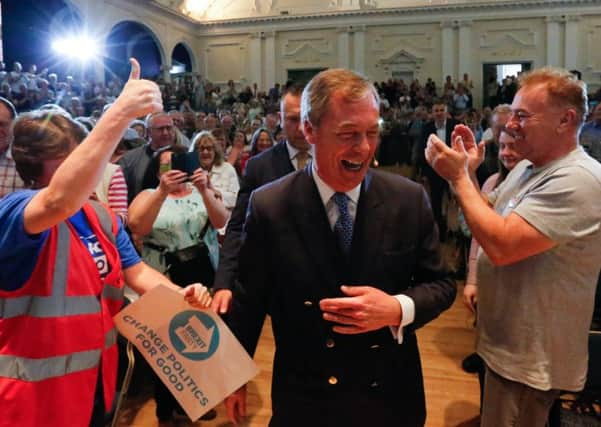Why Tories and Labour may be in trouble at EU elections – Ian Swanson


IT’S an embarrassment – and could soon prove to be a disaster. Asking UK voters to go to the polls next month to elect members of the European Parliament almost three years after they voted to leave the EU looked at one stage like something Theresa May would simply refuse to do. It seemed just too humiliating for a Prime Minister who had promised to deliver Brexit.
Reports looking ahead to the May 23 elections still talk about “if” Britain takes part, but the chances of sudden agreement at Westminster over the withdrawal deal, which has caused so much angst and argument for so long, are basically zero.
Advertisement
Hide AdAdvertisement
Hide AdThere had been talk of a temporary fix – allowing the UK’s current MEPs to carry on or getting parties to send stopgap representatives. But the EU made it clear that there was no way around holding elections.
That’s despite their better instincts, given the call by Tory hard-Brexiteer Jacob Rees Mogg for the UK to be “as difficult as possible” during a long Brexit delay.
So, what will the voters do on May 23? They could behave as they usually do in European elections and stay at home, seeing it as a pointless exercise.
Why bother electing people who may only be there for a matter of months until Brexit finally happens? Traditionally, Euro elections have seen very low turnouts and this one may be no exception. On the other hand, people may opt to turn out in larger numbers than normal, eager to use the opportunity to deliver a verdict on the Brexit saga, treating the elections as a proxy referendum.
Advertisement
Hide AdAdvertisement
Hide AdSome interpreted the result of the Leith Walk council by-election earlier this month as a sign of the latest public feeling on leaving the EU. The Remain parties – the SNP, Greens and Lib Dems – increased their share of the vote while Labour and the Tories saw a fall in support.
It may be a mistake to read too much into a local election fought largely on local issues. But if the May 23 poll does become a referendum substitute the SNP should do well, along with the Greens. Lib Dems have so far failed to reap any reward for their consistent pro-Remain stance, but perhaps they will benefit this time.
Labour – whose Scottish leader Richard Leonard has said he would prefer a “Labour Brexit” to a second referendum with Remain on the ballot paper – may struggle to hold onto some of its natural supporters.
The Tories, who not long ago were being tipped to win an extra seat from Scotland at these elections, now look to be in a tricky position too.
Advertisement
Hide AdAdvertisement
Hide AdOne poll last week showed Nigel Farage’s new Brexit party in the lead across the UK on 27 per cent, with Labour second on 22 per cent and the Conservatives on 15 per cent, though many people said they did not know who they would vote for or that they would not vote. A survey this week also found six out of ten Tory members were planning to vote for the Brexit party.
Far from gaining a seat, it is now being said that the Tories could lose their only Scottish MEP, not to the Brexit party, but more likely to the SNP or the Greens.
Scotland’s longest-serving MEP, Labour’s David Martin is standing again but the SNP’s Brussels veteran Ian Hudghton is calling it a day.
Perhaps he guesses what might in theory be the shortest-lived period of service for any elected representative could turn out to be a much longer haul than anyone expects. There’s no sign of an end to Brexit any time soon.